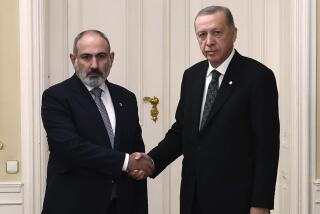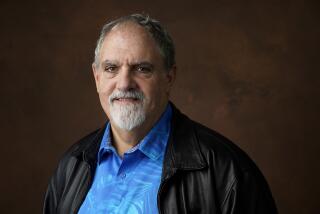J. Michael Hagopian dies at 97; Armenian American documentary filmmaker
J. Michael Hagopian, an educational filmmaker who spent 40 years gathering the testimonies of Armenian genocide survivors to provide evidence of one of the most contentious events in world history, died of natural causes Friday at his home in Thousand Oaks. He was 97.
His death was announced by the Armenian Film Foundation, which he established in 1979 to preserve Armenian heritage and culture.
The filmmaker was a survivor of the genocide, which historians estimate resulted in the deaths of as many as 1.5 million Armenians in Ottoman-ruled Turkey beginning in 1915. The Turkish government acknowledges a smaller number of deaths and attributes them to war, famine and disease, not genocide. It also contends that both Turks and Armenians lost their lives.
Hagopian’s determination to refute the Turkish claims led him to his life’s work: compiling 400 interviews with Armenian genocide survivors and witnesses. He used their accounts in several films on the World War I-era disaster that historians consider the first major genocide of the 20th century.
“My main aim during all these 40 or 50 years was to catch our history for the future,” Hagopian said in a video tribute to him in April arranged by Los Angeles City Councilman Paul Krekorian.
“It’s an extraordinarily special thing to have a survivor of the genocide be the world’s leading chronicler” of the event, Krekorian, whose ancestors came from the same Armenian village as Hagopian’s family, said in an interview Tuesday. “There are a relative handful of survivors left throughout the world, which is precisely why his life’s work is so critically important. Without that work, the memories that all of these witnesses carried with them would have been lost to history.”
Hagopian wrote, directed and produced 17 films about Armenians and the genocide, including “Where Are My People?” (1965), the Emmy-nominated “The Forgotten Genocide” (1975) and “The River Ran Red” (2008). The latter film, which was voted best international historical documentary by the New York International Film & Video Festival in 2009, was the final installment of a trilogy that included “Voices from the Lake” (2000) and “Germany and the Secret Genocide” (2003).
Hagopian was born Oct. 20, 1913, in Kharpert, an ancient town in what is now Turkey. He was 2 when his parents were ordered out of eastern Turkey. Certain that deportation meant forced marches and starvation, they carried their son to a dry well in the middle of a mulberry grove.
“To save my life, [my father] placed me down in it, hoping the Turks would not find me, that by a miracle I would survive. He had great faith in Providence,” Hagopian recalled in a 2001 interview in the Los Angeles Daily News.
Hagopian believed that he and his parents were spared because his father was a prominent physician. They remained in Turkey until 1922, when they fled to the United States. They lived in Boston before settling in Fresno in 1927.
Hagopian studied at Cal State Fresno before transferring to UC Berkeley, where he studied political science, earning a bachelor’s degree in 1937 and a master’s degree in 1938. He earned a doctorate in international relations at Harvard University in 1943.
After serving in the Army Air Forces during World War II, he taught at several universities, including UCLA and American University of Beirut, where he began teaching himself to shoot film footage. He later took film classes at UCLA.
Eager to fill a void in the educational film market, he quit academia and formed his own film company in 1952. One of his earliest efforts was a movie about life on the Nile River, which won top honors at the Cleveland Film Festival in 1952.
“After that,” he told the Ventura County Star in 2008, “there was no turning back.”
He made 70 educational films and documentaries during his career, but none were more important to him than the ones that told the story of his people’s tragic past. In April, he signed an agreement with the USC Shoah Foundation Institute to digitize, index and disseminate the 400 interviews he conducted in 10 countries on the genocide.
According to the foundation, which was established by filmmaker Steven Spielberg to preserve video histories of the Holocaust, Hagopian’s trove constitutes the largest archive of filmed interviews with Armenian genocide survivors and witnesses.
Hagopian is survived by his wife, Antoinette; four children, David, James Michael, Joanne and William; and five grandchildren.
Funeral services will be at 2 p.m. Wednesday in Samuelson Chapel at California Lutheran University, 60 W. Olsen Road, Thousand Oaks.
More to Read
Start your day right
Sign up for Essential California for the L.A. Times biggest news, features and recommendations in your inbox six days a week.
You may occasionally receive promotional content from the Los Angeles Times.








